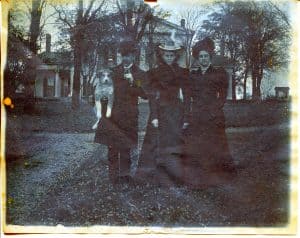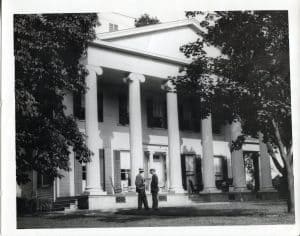After the Swans: The Smiths, 1896-1912
By Alice Askins, Education Coordinator at Rose Hill Mansion

Martin Smith with his daughter May and wife Anna in front of Rose Hill, late 1890s.
The Martin Smith family (Martin with his wife Anna and their daughter May) moved out to Rose Hill from Geneva in 1896. The Advertiser noted that Maggie Swan and Agnes Swan Hutchins would “not feel at all sorry to see that farm come into the possession of M. H. Smith, a warm friend of their father” (February 18, 1896.) Mr. Shires of Maxwell farm said “Mr. Smith bought the farm very cheap.” (This was during a depression.) The Times reported on September 4 that Mr. Smith only paid $17,000 for it” [about $483,000 in 2018 dollars]. Mr. Smith’s eventual obituary says that he was born in Geneva in 1848, and that he attended the local schools and Poughkeepsie Business College. He was politically active and a Republican. At various times he was justice of the peace, Police Justice for Geneva, Ontario County clerk, served on the Board of Health and the Board of Trade, an alderman, a member of the Board of Public Works, Parks Commissioner, and the local fuel administrator during World War I. He was also active in the North Presbyterian Church. Mr. Smith’s father, George Smith, was a farmer in the town of Seneca, so Mr. Smith would have grown up on a farm (Advertiser, November 22, 1898). He may have moved to Rose Hill because he missed country life.
The Gazette mentioned that “The mansion has 28 rooms, is heat[ed] by steam and lighted with gas generated on the premises.” Robert Swan had put in steam heat some time before 1877. The gas lighting would have been carbide lighting (this became available for rural homes around 1894). Carbide mixed with water makes acetylene gas, and people could pipe it through their houses if they lived too far away to get town gas or electricity. It seems that Mr. Plummer’s 1890 generator and electrical systems were gone, possibly repossessed.
The papers did not mention the Smiths again until November 1897, when the Advertiser said that Mr. Smith had not let the farm “drop back a particle” from its fine condition under Robert Swan. Mr. Smith was boarding horses for people. The following January he sued W. H. Biddlecom of Geneva “for petty larceny in removing a horse from the premises of Smith on which the latter had a lien for unsettled pasturage and board of the animal.” (Daily Gazette, January 21, 1898)
In March 1898, the Smiths and Rose Hill suffered a catastrophe—a fire killed nine horses (five of them boarders and four belonging to the Smiths) and destroyed three big barns, several sheds, large quantities of oats, hay, corn, and straw, harnesses, tools, equipment, vehicles, and so on. Twenty one horses were saved. The Daily Times blamed a tramp for the blaze, saying that the Smith farm had been overrun by them (March 7). The Smiths insurance was not enough to cover the loss. “Mr. Smith was so overcome…that he was unable to talk,” said the Advertiser. A week later, the paper assured readers that “Of course Martin H. Smith will rebuild the barns…although probably not as large as before. He says his loss is fully $6000 above insurance.” (March 15. That’s almost $174,000 in 2018 dollars).
A happier event occurred at Rose Hill in June 1900, when May married Edward J. Cook, a Geneva attorney. The Times described the decorations—the parlors were crowded with roses, peonies, palms, ferns, daisies, trailing pine, and smilax. After a honeymoon trip up the St. Lawrence, the couple returned to Rose Hill to live (June 15).
We have a small insight into the lives of Rose Hill’s workers during the Smith era. On September 26, 1900, the Times reported about one of them being robbed of $1.25. The good part of the story is that the victim had $25 on him, but the robber didn’t find it. The article incidentally tells us that the young men of the farm had bicycles and rode them into town on Sunday nights.
By the fall of 1899, Rose Hill farm was supplying milk to the local dairies. A. W. Sperry ran an ad in the Times on October 5: “Having added Martin Smith’s Rose Hill dairy to my well known Fordon dairy supply I can furnish several more families with milk and cream, the quality and purity of which the names of the producers guarantee.” By 1905, Mr. Smith was a director and stockholder of a milk combine called the Geneva Dairy Company (Advertiser-Gazette, February 7). Mr. Smith continued in the business even after he sold Rose Hill (if not as a producer, at least as an executive). In 1930, the Smith son-in-law E. J. Cook was president of the Geneva Milk Company, and Mr. Smith was vice president. The Times said they had been connected with the company throughout its 21 years of existence (June 28).

Martin Smith and Edgar Boody in front of Rose Hill Mansion
On October 10, 1912, the Advertiser-Gazette reported that Mr. Smith had sold his farm to Edgar Boody of Brooklyn, who would take possession the following March. Apparently, Mrs. Smith preferred city living as the paper report—“The sale is entirely satisfactory to Mrs. Smith, who will shed no tears when the first of March rolls around…” The Smiths moved to South Main Street in Geneva. Mrs. Smith lived only to January 1915, but Mr. Smith lived until 1939.
——————————-
Discover more about the families who called Rose Hill home with the Historical Society’s newest publication Rose Hill Mansion: From Progressive Farm to Historic House Museum. To purchase a copy visit this link to our online shop or call 315-789-5151.

It was great to read about my great grandfather and Rose hill farm. A lot of it I knew from readings and my mother which is May Martin Smiths daughter. Her father was Edward John Cook. But it always nice to get more background on your family and how they lived. My Mom is doing well at 98 and I will read her this sometime soon. Thank you for the interesting article!
We are so glad you enjoyed this short history of your family at Rose Hill. If you or your mother has anything to add to our information on the Smith family, either at Rose Hill or in Geneva, we would be happy to hear of it. We are always looking to collect more of the community’s history. Thank you for your comment and appreciation.